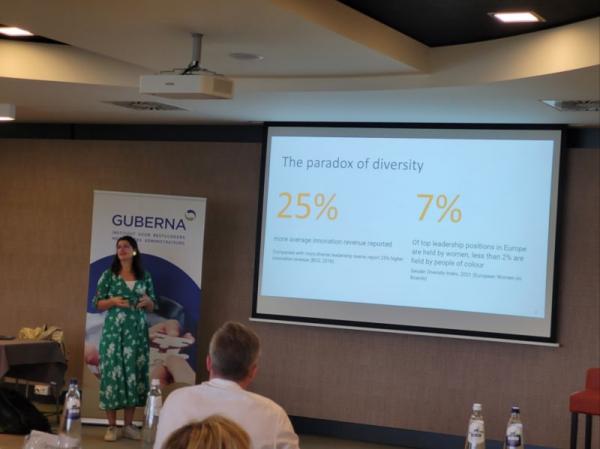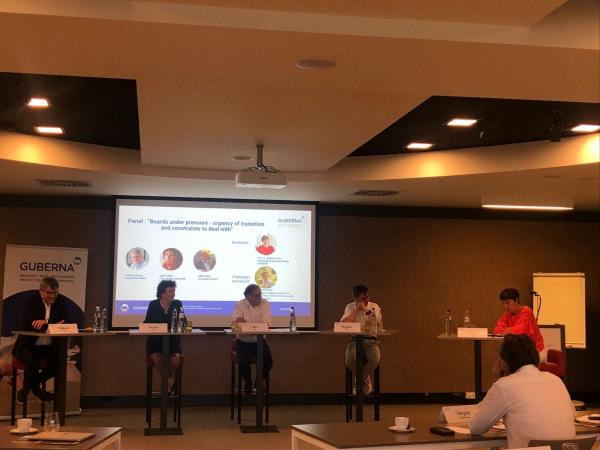A call for (better) impact of the board: how to put purpose into practice?
On June 30th the annual GUBERNA Summer School gathered our certified directors, members and experts around the following important questions: How to better equip decision-makers for the many sustainability challenges that companies and organisations are facing? How does your board of directors put 'purpose' into practice? How does your organisation really contribute to a better environment, better social working conditions and better governance?

Reflections from the GUBERNA Summer School
ESG issues and sustainable value creation are at the heart of the GUBERNA "CAP 2030 - Governance in transition" action plan. In fact, one can no longer get away with saying that, in accordance with points 2.1 and 2.2 of the Belgian corporate governance code, one aims for sustainable value creation. A reassuring reference to the explanatory memorandum on sustainable value creation or an explicit confirmation that you are successfully pursuing several SDGs? Today, that is not enough anymore.
Keynote speech
To help concretise our goal, we invited, among others, Valérie Swaen, Professor of Marketing and CSR at UCLouvain and President of the Louvain Research Institute in Management and Organisations (LouRIM, UCLouvain). Valérie is also leading the Louvain CSR network that gathers and supports researchers and practitioners who seek to put responsible leadership, and sustainable production and consumption, at the heart of their research and strategy.

In her speech, she gave examples and models of how companies put their societal purpose into practice. She opened with quoting the definition of Philippe de Woot: "The purpose of a company is to create economic, technological and societal progress in a sustainable and globally responsible way" (in Rethinking the Enterprise, Ph. De Woot, 2017). Hence, Valerie Swaen calls on every company to define its own 'broad purpose'. The most important benefit of doing so is the motivation and commitment of the employees; they remain the most important asset of any company.
Plenty of challenges
Valerie Swaen continued with an (impressive) contextual background including the enumeration of the most relevant sustainability problems. They are all interlinked:
- climate change
- the loss of biodiversity
- food and water scarcity
- various migration conflicts and refugee issues, modern slavery
- the political instability and geopolitical conflicts
- rise of hyper-inequality / wealth inequality
On the positive side, she does see a number of hopeful evolutions, such as: the growing importance of stakeholders (whose roles will be empowered by technology); supply chain management at the centre of the business agenda; the convergence towards common, long-term science-based target indicators; more integrated management; the development of new types of cooperation between economic and social actors.
European framework
The European efforts to regulate good governance, sustainable investment, avoiding greenwashing, sharpening the focus of everyone's rights and obligations and increasing transparency will, in time, further encourage us to engage in sustainable business activities.
This requires, among other things, a common conceptual framework and credible labels for formal sustainability reporting. Today, too many frameworks still set the tone: GRI, IR, SASB, WBCSD, UNGC, ISO, OECD, TCFD, etc. Unfortunately, these sustainability models are still competing. They all focus differently on the process of value creation and the corresponding transparency obligations. We will spare you the details...
Action points
Pending more clarity on the political front, Professor Valerie Swaen has a few suggestions that every company can get to work with:
- invest in education, technology, research and innovation
- develop an ‘ecosystemic’ perspective
- gain more insight into how your business creates but also destroys (economic, environmental, social) value
- deepen your understanding of the risks and impacts of your transition processes,
- In particular, identify, assess and address the social impacts of the ecological transition
- Include stakeholders in the assessment of risks and opportunities
- Why not to create a Sustainability board with veto rights for major decisions
- ‘Planet Artificial intelligence’ to represent the needs of ‘planet Earth’
- work on more inclusion and maximum employee engagement
- make sure that your climate policy does not increase inequality (because people with a low income should also have access to sustainable products!)
- look for more cooperation across sector boundaries
- prepare to adapt or transform your business model.
From her practical research, she immediately added some warnings. An ambitious corporate purpose also implies challenges:
- Ambitious social goals can sometimes run directly counter to traditional corporate goals.
- A broadly supported purpose must strive to achieve social impact primarily outside the corporation and only in a subordinate order 'within the corporation' itself.
- If the 'purpose' is not authentically pursued outside the company, it becomes difficult to continue to inspire internal stakeholders.
She warns: "Most multinational companies articulate and communicate their corporate purposes already beyond pure profit maximization but fail to realize them. The growing gap between purpose and practice causes a rapid erosion of the level of trust in business "
Delivering on purpose?
The core of Professor Swan's speech was the presentation of a real business ecosystem orchestration, with illustrations such as the implementation carried out by Novo Nordisk (inspired from a book published by Colin Mayer and Bruno Roche “Putting Purpose into Practice”).
A business ecosystem is a network of organizations that are involved in the delivery of a product or service. The purposeful corporation can engage with these stakeholders and orchestrate the business ecosystem both to deliver its purpose and co-create shared value.
This orchestration 8-steps process can be summarized as such:
- Establish your purpose
- Design your purpose metrics
- Identify the stakeholders relevant to your purpose
- Map their objectives, capabilities, relationships, and pain points
- Select the key strategic pain points in this ecosystem that your organization wants to address
- Measure the baseline performance metrics: design and implement the performance metrics to track your impact on the key strategic pain points
- Identify, test, and implement interventions addressing these pain points
- Measure the impact of your interventions on both the purpose and performance metrics
Concluding key messages
In her second part, she became very concrete with inspiring practical examples from, among others, the Group Solvay. She also discussed some proven tools to define and report on value creation, performance and new earning models. There are various tools or systems available to work on your 'purpose' in a structured way. In each case, it comes down to 'governance' and 'corporate culture'.
In any case, her seven conclusions inspired us to engage in more reflection, debate ... and action:
- Sustainability issues are more and more complex and interconnected
- Integrating sustainability in business is not a nice-to-have anymore
- A corporate purpose aims to achieve social impact primarily outside the corporation
- There is a growing gap between purpose and practice
- There is a need for a new definition of the boundaries of the business ecosystem, a more complete definition of performance, a more comprehensive process of value creation that goes beyond financial profit alone
- The purposeful corporation engages with classical and new stakeholders and orchestrates the business ecosystem both to deliver its purpose and co-create shared value
- There are many tools to help companies – but stay critical!

GUBERNA’s Governance roadmap to sustainable value creation
Inspired by professor Swaen’s messages, we take our action plan “CAP 2030: Governance in transition” further in our research and education programmes. We are conducting a study on sustainable value creation in listed companies of which the report will be published this year; and in November we are having a two-days program focusing on a governance roadmap to sustainable value creation. Building on your input during the Summer School, we will discuss in-depth what sustainability can mean for boards, using cases, exercises, testimonials and conceptual frameworks.
A governance roadmap to sustainable value creation | GUBERNA

What about your approach?
‘Sustainability', and above all its implementation, remains a broad and complex concept that means something different to each organisation. That is why we at GUBERNA are interested to hear what your Board of Directors considers to be the biggest challenge. What could the real impact of a truly sustainable policy be for your organisation?
How do you translate these principles to your size? What are your first results? What problems do you continue to struggle with, if any? To what extent are your shareholders and stakeholders involved? Do they weigh in on the way the company is run or how the board of directors is composed? How loud is the call for a sustainability committee or sustainability reporting? Or are you already working on this?
With your cooperation, we can go further and act better. Hence this call to fill out our questionnaire.
Thank you!
